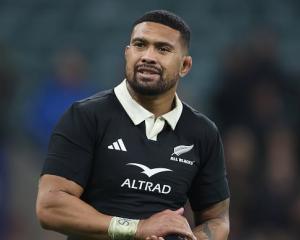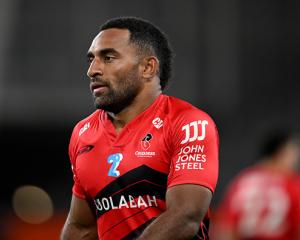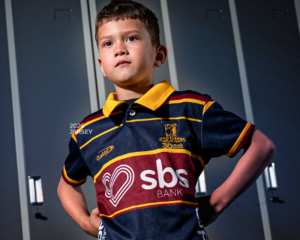But three weeks after the death of winger Jim Sherratt at the age of 92, a souvenir ball signed by the post-war rugby union Kiwis has finally found its way to the Hall of Fame.
Son-in-law Kevin Taylor found the ball hidden in a pewter cup when he returned to Katikati for the funeral of the man nicknamed by the French "Le Beau Grand Cheval" - the beautiful big horse.
Taylor described Sherratt, a lieutenant who served in Fiji and then in the artillery on the front line in Italy, as a gentle giant.
"Nothing ever bothered him," he said.
Sherratt's wife Kath said her late husband, who never got the opportunity to represent the All Blacks, had fond memories of the tour.
"They had a wonderful time. They'd all survived the war."
The New Zealand Expeditionary Force team, known as the Kiwis, was the brainchild of Bernard Freyberg.
Interviews were conducted in 1945 in Italy and Egypt for all those who thought they were a chance of making the side, and 396 soldiers put their names forward.
The tour marked the beginning of a new era of New Zealand rugby, and the team fulfilled Sir Freyberg's aim of playing an attractive running style.
Right wing Sherratt played his part, scoring 23 tries - more than any other New Zealand player to ever tour the British Isles.
The Kiwis won 29 of their 33 games on tour, including matches against France, England and Wales.
The party included just one pre-war All Black, but 16 players returned to pull on the black jumper, including Bob Scott, who had high praise for Sherratt's performance against the French: "He had size, dash, tremendous courage and a bump heavy enough to knock the best tacklers flying."
Among the group was Charlie Saxton and Fred Allen, who later became the manager and coach of the 1967 All Blacks respectively.
The Kiwis are only one of four rugby union teams in the New Zealand Sports Hall of Fame, alongside the 1905 Originals, the 1924 Invincibles and the 1987 World Cup-winning All Blacks.
Kiwis manager Allan Andrews' tour report includes various references to the standard of officiating encountered on tour.
"With the exception of referees in Wales and countries adjacent to Wales - very good. In Wales and adjoining countries - one-eyed," he wrote.
"I have always wondered if there wasn't at least one honest Welsh player."




!["It’s just one year [that Dunedin misses out]. There are opportunities again in the future for...](https://www.odt.co.nz/sites/default/files/styles/odt_landscape_small_related_stories/public/story/2025/12/gettyimages-1190749175-594x594.jpg?itok=jxN1B1bV)






